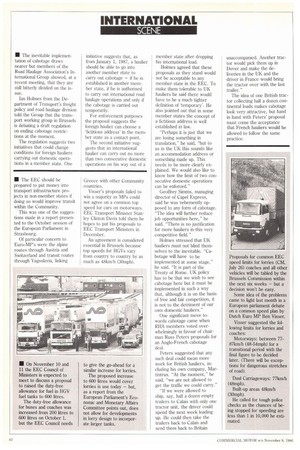in The inevitable implementation of cabotage draws nearer but members
Page 84

If you've noticed an error in this article please click here to report it so we can fix it.
of the Road Haulage Association's International Group showed, at a recent meeting, that they are still bitterly divided on the issue.
Ian Holmes from the Department of Transport's freight policy and road haulage division told the Group that the transport working group in Brussels is debating a draft regulation on ending cabotage restrictions at the moment.
The regulation suggests two initiatives that could change conditions for foreign hauliers carrying out domestic operations in a member state. One initiative suggests that, as from January 1, 1987, a haulier should be able to go into another member state to carry out cabotage — if he is established in another member state, if he is authorised to carry out international road haulage operations and only if the cabotage is carried out temporarily.
For enforcement purposes the proposal suggests the foreign haulier can choose a 'fictitious address' in the member state as a contact point.
The second initiative suggests that an international haulier can carry out no inure than two consecutive domestic operations on his way out of a
member state after dropping his international load.
Holmes agreed that these proposals as they stand would not be acceptable to any member state in the EEC. To make them tolerable to UK hauliers he said there would have to be a much tighter definition of 'temporary'. He also pointed out that in some member states the concept of a fictitious address is well established in law.
"Perhaps it is just that we are losing something in translation," he said, "but to us in the UK this sounds like an accommodation address or something made up. This needs to be more clearly explained. We would also like to know how the limit of two consecutive domestic operations can be enforced."
Geoffrey Simms, managing director of Capel Express, said he was vehemently opposed to any form of cabotage. "The idea will further reduce job opportunities here." he said. "There is no justification for more hauliers in this very competitive field."
Holmes stressed that UK hauliers must not blind themselves to the inevitable. "Cabotage will have to be implemented at some stage," he said. "It is part of the Treaty of Rome. UK policy has to be that we wish to see cabotage here but it must be implemented in such a way that, although it is on the basis of free and fair competition, it is not to the detriment of our own domestic hauliers."
One significant move towards cabotage came when RHA members voted overwhelmingly in favour of chairman Russ Peters proposals for an Anglo-French cabotage deal.
Peters suggested that any such deal could mean more work for British hauliers, including his own company, Martintrux. "At the moment," he said, "we are not allowed to get the traffic we could carry."
"If we were allowed to ship, say, half a dozen empty trailers to Calais with only one tractor unit, the driver could spend the next week loading up. He could then take the trailers back to Calais and send them back to Britain unaccompanied. Another tractor would pick them up in Dover and make the deliveries in the UK and the driver in France would bring the tractor over with the last trailer."
The idea of one British tractor collecting half a dozen continental loads makes cabotage look very attractive, but hand in hand with Peters' proposal must come the acceptance that French hauliers would be allowed to follow the same practice.




















































































































